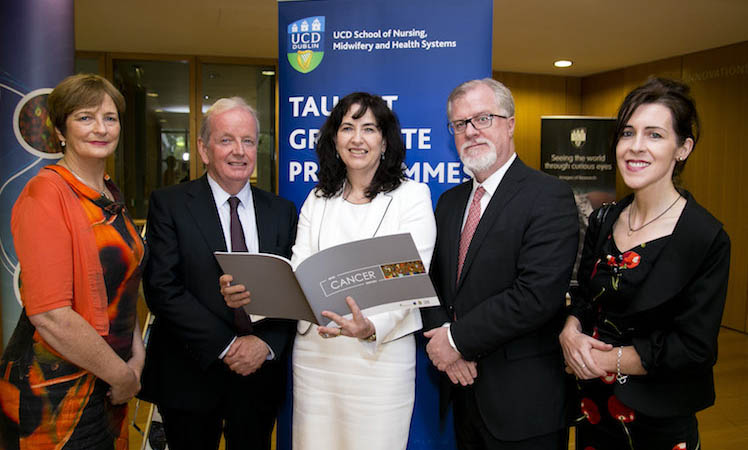New cancer centre partnership to deliver improved treatment

Posted July 01, 2016
- New cancer treatment centre will cater for a population of 1.1 million
- Directorate will have clear focus on genetics for more targeted personalised therapies
The largest cancer treatment centre in Ireland has been launched in a partnership between University College Dublin and the Ireland East Hospital Group (IEHG).
The Clinical Academic Directorate for Cancer Care (CaCAD) will be the largest cancer treatment centre in the country and will serve a population of 1.1 million people.
The centre will treat more than 45 per cent of all breast cancer cases in Ireland and 25 per cent of all pancreas cancer cases. It will also account for 50 per cent of all breast cancer screening in Ireland.
The Ireland East Hospital Group (IEHG) is the largest of the country’s seven hospital groups and encompasses 11 hospitals, including the (opens in a new window)Mater Misericordiae University Hospital and (opens in a new window)St Vincent's University Hospital and its formal academic partner UCD.
Pictured top: Dr Eileen Furlong, Lecturer, UCD School of Nursing Midwifery and Health Systems, Professor Des Fitzgerald, IEHG Chief Academic Officer (CAO) and Vice President for Health Affairs at UCD, Mary Day, CEO IEHG, Prof Owen Smith (CBE) CaCAD Director IEHG, Dr Patricia Fox, Lecturer, UCD School of Nursing Midwifery and Health Systems, at the launch at UCD of the Clinical Academic Directorate for Cancer Care (CaCAD)
The joint venture will deliver improved cancer care to patients, in terms of the range, depth and complexity of care required and the scientific discovery that underpins new and evolving treatments.
The Directorate will involve cancer experts at St. Vincent’s University Hospital (SVUH) and the Mater Misericordiae University Hospital (MMUH) working together with research and teaching experts in UCD.
“This new single entity will mean larger departments, more sub-specialisation, an expansion in the range of services and more personalised medicine with a clear focus on genetics and translating research benefits into better patient care,” said Professor Owen Smith CBE, Clinical Director of the CaCAD.
IEHG/UCD new Clinical Academic Directorate for Cancer Care now largest cancer care centre in the country! (opens in a new window)pic.twitter.com/IT1Pxefrdz
— IEHG (@IEHospitalGroup) (opens in a new window)July 1, 2016
Professor Smith is also Professor of Paediatric and Adolescent Medicine at University College Dublin and Consultant Paediatric Haematologist at (opens in a new window)Our Lady’s Children’s Hospital, Crumlin, Dublin.
“We are developing an academic health sciences model for the Ireland East Hospital group by establishing Clinical Academic Directorates, beginning with a Clinical Academic Directorate for Cancer,” said Mary Day, CEO of IEHG.
“Using this internationally recognised model of best practice we aim to transform and improve the clinical services for the 1.1 million people served by the group."
A framework document, ‘IEHG Cancer Review of Services’, has also been published. The document outlines how, through the CaCAD, multidisciplinary teams from MMUH, SVUH and across the group, will collaborate to provide diverse expertise for cancer patients.
The Directorate’s genetics programme will be supported by a next-generation gene sequencing laboratory recently established at UCD.
“More and more, the clinical care of patients with cancer relies on such technology, for diagnosis and more targeted therapy,” said Professor Des Fitzgerald, IEHG Chief Academic Officer (CAO) and Vice President for Health Affairs at UCD
“The university has developed clinical trials facilities so that new therapies can be brought to our patients quickly and will continue to expand the Directorate’s capacity for clinical research.”
UCD is also establishing a research imaging centre in partnership with St Vincent’s University Hospital, which will help in rapid diagnosis and monitoring of treatment.
The university will also contribute to the Directorate through its educational and training programmes for healthcare professionals who want to pursue careers in oncology.
By: Jamie Deasy, digital journalist, UCD University Relations
UCD academics on The Conversation
- Opinion: The leap year is February 29, not December 32 due to a Roman calendar quirk – and fastidious medieval monks
- Opinion: Nigeria’s ban on alcohol sold in small sachets will help tackle underage drinking
- Opinion: Nostalgia in politics - Pan-European study sheds light on how (and why) parties appeal to the past in their election campaigns






